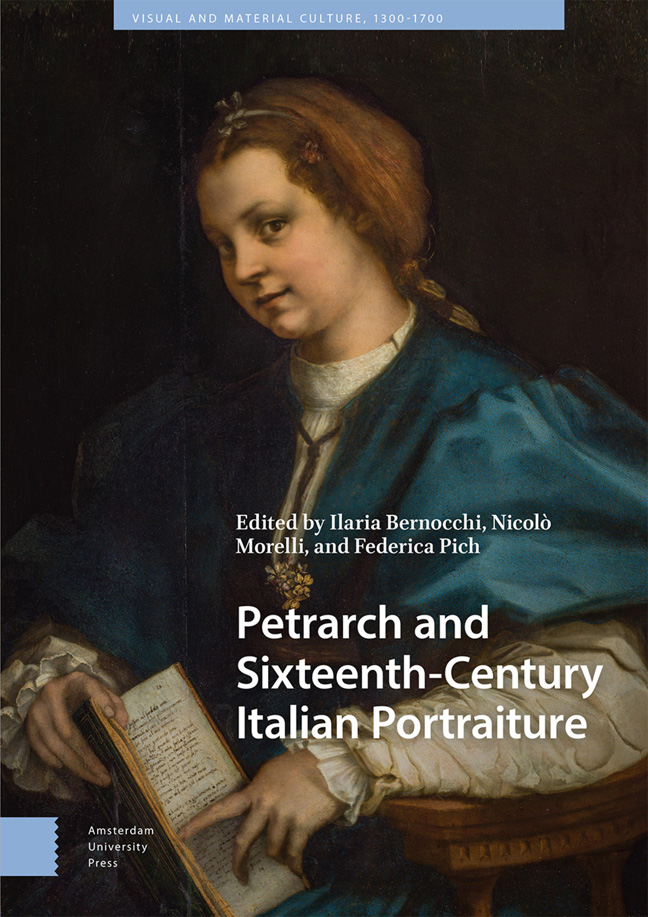Book contents
- Frontmatter
- Contents
- List of Illustrations
- Acknowledgements
- 1 Introduction
- 2 Widows, Poetry, and Portraits: Livia Spinola and Francesca Turina on the Portraits of their Dead Husbands
- 3 In Medusa's Eyes: Petrification and Marble Portraits in Late Sixteenth-Century Poetry
- 4 The Portrait of the Ideal Woman: Petrarch in Conduct Literature Texts for and about Women
- 5 Anti-Petrarchist Portraiture or a Different Petrarchist Portraiture?: A Literary Outlook on Some Non-Idealised Female Sitters in Renaissance Art
- 6 The Shadow of Petrarch: Benedetto Varchi and Agnolo Bronzino on Portraiture
- 7 Double Portraits of Petrarch and Laura in Print (c. 1544–1600)
- 8 Sonnet ‘Diptychs’ and Double Portraits: Figurative Allusions in Sixteenth-Century Encomiastic Poetry
- 9 Images of Women from Subject to Frame in Printed Portrait Books
- Bibliography
- Index
1 - Introduction
Published online by Cambridge University Press: 22 February 2024
- Frontmatter
- Contents
- List of Illustrations
- Acknowledgements
- 1 Introduction
- 2 Widows, Poetry, and Portraits: Livia Spinola and Francesca Turina on the Portraits of their Dead Husbands
- 3 In Medusa's Eyes: Petrification and Marble Portraits in Late Sixteenth-Century Poetry
- 4 The Portrait of the Ideal Woman: Petrarch in Conduct Literature Texts for and about Women
- 5 Anti-Petrarchist Portraiture or a Different Petrarchist Portraiture?: A Literary Outlook on Some Non-Idealised Female Sitters in Renaissance Art
- 6 The Shadow of Petrarch: Benedetto Varchi and Agnolo Bronzino on Portraiture
- 7 Double Portraits of Petrarch and Laura in Print (c. 1544–1600)
- 8 Sonnet ‘Diptychs’ and Double Portraits: Figurative Allusions in Sixteenth-Century Encomiastic Poetry
- 9 Images of Women from Subject to Frame in Printed Portrait Books
- Bibliography
- Index
Summary
This volume explores the multiple ways in which the legacy of Francesco Petrarca (Petrarch, 1304–1374) shaped the relationship between literary and visual portraits in the sixteenth century. Building on the extensive and diverse body of research on Petrarch and the arts produced by historians of both art and literature, this collection adopts a specific critical angle, focusing on different concepts and dimensions of Petrarchan and Petrarchist ‘portraiture’ in an interdisciplinary perspective.
By ‘portrait’ today we commonly indicate the so-called ‘image of an individual’, which is also the title of a pivotal collection of essays edited by Nicholas Mann and Luke Syson in 1998. The definition of ‘individual’, however, as scholars dealing with portraiture have long known, is a treacherous terrain. The association between the rise of the ‘spiritual individual’ as manifested by a rich corpus of painted and sculpted portraiture, and the dawn of the Renaissance, of which Petrarch can be legitimately considered the putative intellectual father, has deep roots in Jacob Burckhardt's influential Civilization of the Renaissance in Italy (1860). Burckhardt's essay has been much debated in subsequent scholarship and reframed in the context of the author's nineteenth-century sensitivity. On the other hand, the importance of portraiture in the late Middle Ages, when Petrarch was writing, has been advanced by an ever-growing corpus of robust scholarship. More recent responses to the Burckhardian view of the Renaissance individuality have posited an opposite model of individuality, one consciously built ‘from the outside in’ as a result of social and cultural conditionings. In his nuanced essay on the ‘myths of individualism’, John Jeffries Martin tried to address this ambivalence, pointing to the Renaissance individual as being constantly negotiating the relationship between the internal and external self. Quoting Douglas Biow, he even hinted at the more extreme consequence of this negotiation, the modern fragmentation of the self.
What is Petrarch's place in this debate? In many ways, the Rerum vulgarium fragmenta does not offer a single or straightforward answer to the issue of individuality: the autobiographical nature of the collection charts in unprecedented detail his spiritual and personal journey; at the same time, the ex post facto editing work on the sequence of poems indicates a conscious act of ‘self-fashioning’ aimed at conferring universal value on his individual experience;
- Type
- Chapter
- Information
- Petrarch and Sixteenth-Century Italian Portraiture , pp. 13 - 42Publisher: Amsterdam University PressPrint publication year: 2023



